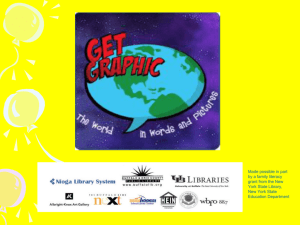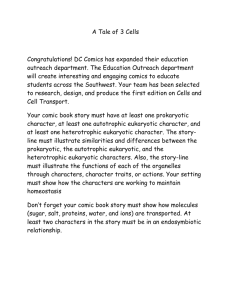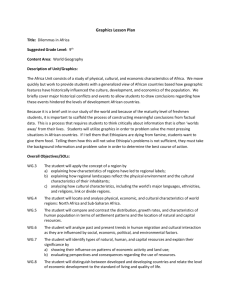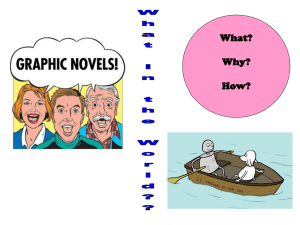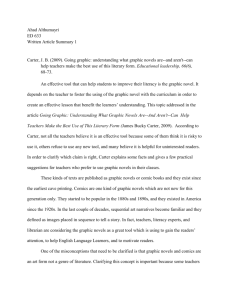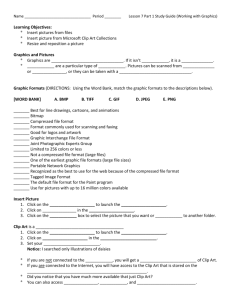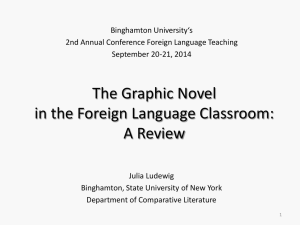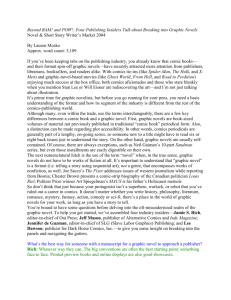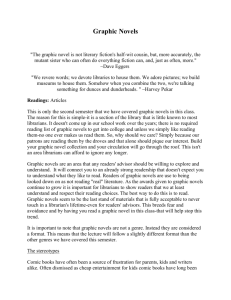Syllabus - University of Hawaii
advertisement
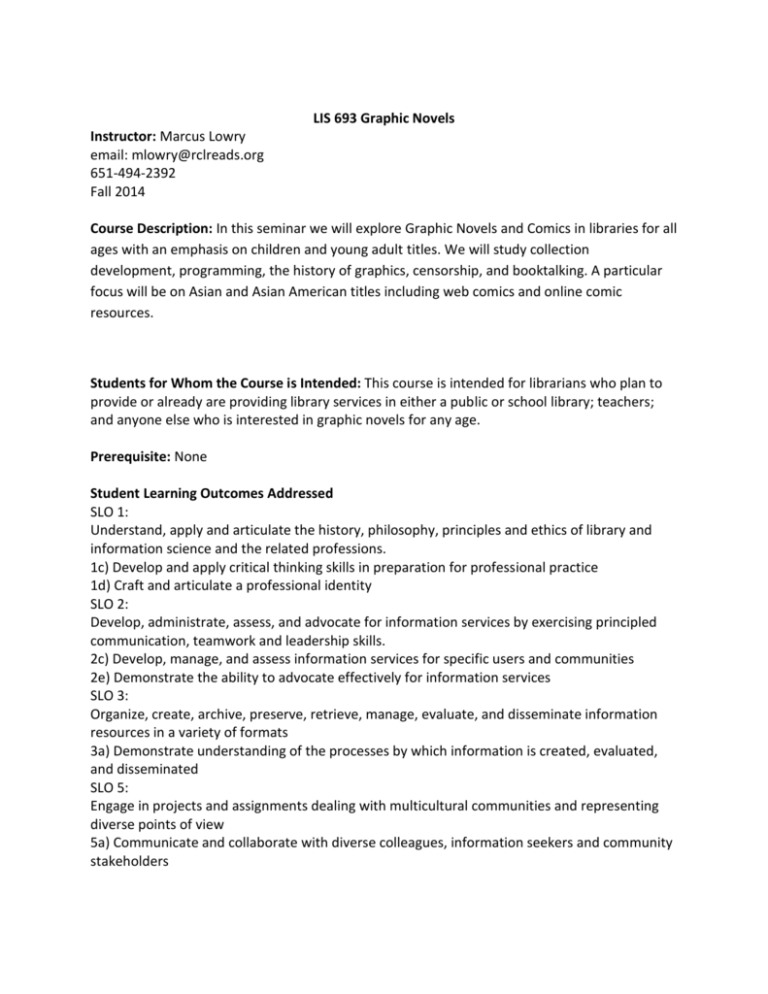
LIS 693 Graphic Novels Instructor: Marcus Lowry email: mlowry@rclreads.org 651-494-2392 Fall 2014 Course Description: In this seminar we will explore Graphic Novels and Comics in libraries for all ages with an emphasis on children and young adult titles. We will study collection development, programming, the history of graphics, censorship, and booktalking. A particular focus will be on Asian and Asian American titles including web comics and online comic resources. Students for Whom the Course is Intended: This course is intended for librarians who plan to provide or already are providing library services in either a public or school library; teachers; and anyone else who is interested in graphic novels for any age. Prerequisite: None Student Learning Outcomes Addressed SLO 1: Understand, apply and articulate the history, philosophy, principles and ethics of library and information science and the related professions. 1c) Develop and apply critical thinking skills in preparation for professional practice 1d) Craft and articulate a professional identity SLO 2: Develop, administrate, assess, and advocate for information services by exercising principled communication, teamwork and leadership skills. 2c) Develop, manage, and assess information services for specific users and communities 2e) Demonstrate the ability to advocate effectively for information services SLO 3: Organize, create, archive, preserve, retrieve, manage, evaluate, and disseminate information resources in a variety of formats 3a) Demonstrate understanding of the processes by which information is created, evaluated, and disseminated SLO 5: Engage in projects and assignments dealing with multicultural communities and representing diverse points of view 5a) Communicate and collaborate with diverse colleagues, information seekers and community stakeholders 5b) Demonstrate understanding of the social and cultural context of information services and systems Course Learning Objectives: Students who complete this course will: 1 Identify outstanding authors of graphic novels 2 Explain techniques for selecting and maintaining a graphic novel collection in public and school libraries 3 Know how to access reviews and professional literature about graphics 4 Articulate the uniqueness and diversity of graphic novels 5 Assess the role of comics and graphic novels in Asian and western society 6 Examine the complexities inherent in issues related to censorship 7 Locate, evaluate, and use internet resources that incorporate graphics 8 Develop skills and specific techniques on effective booktalking 9 Create an annotated bibliography of a specific genre or type of graphic novel Teaching Methods: Videos, readings, written assignments, book talks, online discussions, presentations Instructor’s Expectations: Online instruction has some inherent challenges that I will try to mediate by promoting interaction and reflection as much as possible. The expectation is that all readings and assignments will be done on time, and that students will participate fully in the online discussions. All students are required to respond to all the dialogues shared on the class site. Professional Expectations for Library and Information Science Graduate Students at UH LIS graduate students are responsible for observing the highest standards of intellectual and personal honesty in every aspect of their careers at the University of Hawaii. The University’s Student Conduct Code represents a zero tolerance policy, the penalties for academic dishonesty are severe and ignorance is not an acceptable defense. Students are required to be familiar with University policies on academic integrity including: *The University of Hawaii Student Conduct Code http://www.manoa.hawaii.edu/students/conduct / and http://www.manoa.hawaii.edu/students/conduct/impermissible_behavior.html *The University of Hawaii at Manoa Campus Policies http://www.catalog.hawaii.edu/about‐uh/campus‐policies1.htm The field of Library and Information promotes ethical conduct of its members through published codes of ethics and standards of conduct. LIS students as pre‐professionals are expected to adopt and to enact these standards and codes in their degree work in classes, written assignments, oral presentations, group work, at internship, practicum and fieldwork sites, and in personal, Internet and phone communications related to their LIS studies. Students are required to be familiar with the ethical guidelines of professional associations including but not limited to the following: *ALA Code of Ethics http://www.ala.org/ala/oif/statementspols/codeofethics/codeethics.htm Guidelines for Behavioral Performance of Reference and Information Service Providers http://www.ala.org/ala/rusa/rusaprotools/referenceguide/guidelinesbehavioral.htm *ASIST Professional Guidelines: http://www.asis.org/AboutASIS/professional‐guidelines.html *Society of American Archivists Code of Ethics: http://www.archivists.org/governance/handbook/app_ethics.asp Principles of Ethical Conduct Propriety. Students should maintain high standards of personal conduct in the capacity of identity as a student of the University of Hawaii. Competence and Growth. Students should strive to become proficient in academic performance and professional practice, functions, and activities. Development of Knowledge. Students should take responsibility for identifying, developing, and fully utilizing knowledge for academic assignments and professional practice. Scholarship and Research. Students engaged in study and research should be guided by the conventions of scholarly inquiry and academic integrity. Students must be familiar with an follow the requirements of the course syllabus. Service. Students should regard as primary the service obligation to internship, practicum, fieldwork or community sites, as well as to student professional organizations. Confidentiality. Students should respect the privacy of information users and hold in confidence all information obtained in the course of professional service at practicum, community internship, and fieldwork sites. Commitments to Organizations. Students should adhere to commitments made to practicum, community, internship, and fieldwork sites, as well as to student professional organizations. Respect, Fairness, and Courtesy. Students should treat staff, student colleagues, professional and faculty with respect, courtesy, fairness, and good faith in all communication settings, including online, classrooms, group meetings, internship and fieldwork sites, and faculty and departmental offices. Integrity. Students should act in accordance with the highest standards of professional integrity to uphold and advance the values, ethics, knowledge, and mission of the profession as outlined in professional codes of ethics and standards of conduct. Approved by the LIS Faculty on 19 March 2007 Technology Integration and Requirements: In this course, you will be expected to do the following: Conduct online searches to develop content for presentations Create multimedia presentations using Powerpoint or other presentation applications Access the UHM Laulima system for additional readings and online discussions Required Texts: Understanding Comics, Scott McCloud, William Morrow paperbacks, 1994 Boxers/Saints, Gene Leun Yang, First Second, 2013 Smile, Raina Telgemeier, Graphix, 2010 Night Fisher, R Kikuo Johnson, Fantagraphics, 2005 Ichiro, Ryan Inzana, Houghton Mifflin Harcourt, 2012 Attack on Titan vol 1, Kodansha comics, 2012 Stargazing Dog, NBM Publishing, 2011 Nothing Can Possibly Go Wrong, Prudence Shen and Faith Erin Hicks, First Second, 2013 March: Book One, John Lewis, Andrew Aydin, and Nate Powell, Top Shelf, 2013 A Bride's Story vol 1, Kaoru Mori, Yen Press, 2011 My Friend Dahmer, Derf Backderf, Abrams, 2012 Saga Vol 1, Brian K Vaughn, Image, 2012 Any Little Lit graphic novels edited by Art Spigelman and Francoise Mouly Any Jon Murakami title for kids Any Batman graphic novel Any Spiderman graphic novel Any Usagi Yojimbo by Stan Sakai Additional readings posted on UHM Laulima system Letter grades for the Course: A+ 100-98 B 86-83 C- 72-70 A 97-94 B- 82-80 D+ 69-67 A - 93-90 C+79-77 D 66-63 B+ 89-87 C 76-73 D- 62-60 For final grades, weighting will be based on approximately these percentages*: Assignments 20% Reflection papers 10% Comic creation 10% Booktalking 20% Readers Advisory Guide 40% Final Project Reflection Papers Every week there will be assigned reading. Post a minimum of 250 words reflecting on the ideas raised and how the library fits into what you are learning. I will give specific prompts during each class that should be addressed in your weekly essays. Comic Creation Create a comic either using an online comic creator of your choice, or if you are feeling inspired, draw your own and scan it. The comic should be instructional about a library service or a fictional event. For example, create a comic promoting a manga club, a comic festival at a library, or highlighting something a public or school library can offer its patrons/students. In addition to the comic, reflect on the process of creating it including the justifications for the format and artistic choices in relation to our discussion about how comics convey meaning. Booktalking Booktalking is an important skill to develop to interest readers in trying an unknown title. Its’ primary audience is the non-user which is an essential population in outreach efforts. Pick three graphics you would like to promote to the audience of your choice. You are going to post a video of yourself booktalking these titles to our class site. Readers Advisory Guide Create a readers advisory guide that features a specific category or genre of graphic novels. As part of the project, include an introduction where you explain the target audience and methodology used in selection. There should be a minimum of 25 items in your guide. You are not limited to only graphic novels if other types of resources fit with your theme. For example, biographies of comic artists or non-fiction books can sometimes be paired well with graphics. Possible guides could be: Independent voices for all-ages Cross-cultural intersections Superheroes for new adults The future of Hawaiian graphics Manga for non-Manga readers Final Project As the class is progressing, take note of possible projects that are of particular interest. I would like a formal proposal by Week 9. This is your chance to deepen your understanding of a specific topic. Projects could be research papers, multimedia presentations, writing a graphic novel, planning a graphics convention at your library, or whatever you feel inspired to do as long as it meets library school standards of excellence. Schedule Introduction General Comics History History of Asian American Comics and Graphics Hawaiian Comics and Graphics Elementary age Graphics Non-fiction Graphics DC and Marvel Assignments and Readings Week 1 Understanding Comics Week 2 Finish Understanding Comics Week 3 Any Usagi Yojimbo Collection Development Webcomics Manga Manga Manga Middle School Graphics Intellectual Freedom/Censorship Outreach/Programming High School Graphics Week 8 Reader’s Advisory Guide Due Week 9 Final Project Proposal Due Week 10 Attack on Titan vol 1, Week 11 Boxers/Saints, Ichiro Week 12 Saga Vol 1 Week 13 book talk assignment due Week 14 Night Fisher, Nothing Can Possibly Go Wrong, Week 15 Bride’s Story, Stargazing Dog Week 16 Final Project Due Graphics for Adults Final Projects/Summary Week 4 Jon Murakami Week 5 Smile, Little Lit, Comic creation due Week 6 March Vol 1, My Friend Dahmer Week 7 Batman and Spiderman


